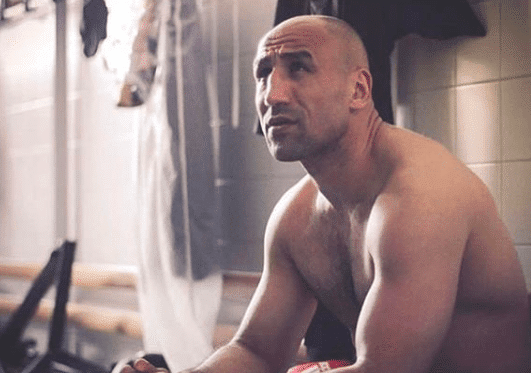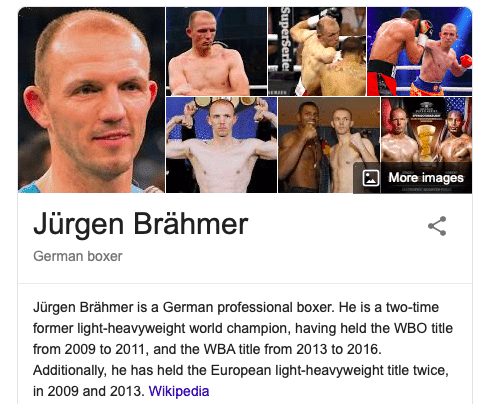By PETE CARVILL
It seems likely that we are moving towards a match-up between Arthur Abraham and Felix Sturm. As yet, there is no venue, no promoter of record, no announcement, and no spurious ‘title’ that the two would be fighting for. But every indication is that we are due to see this happen in 2020.
Quoted in Bild on 26 January, Abraham (below) said that there had been negotiations between the two camps. “I hope that the fight will come about this year. Of course, Ulli Wegner and Georg Bramowski will be my trainers.”
It is a build up that has been going on for nearly a year, which would seem remarkable given the relatively-advanced ages of both men—Abraham is thirty-nine, Sturm is forty-one. And given the paucity of the German boxing scene, about which I’ve written before, it is arguably the biggest fight that could be put together domestically. There are reasons, however, for the protracted build-up.
It began in April last year with the shock announcement that Felix Sturm had been arrested in Cologne. The charges related to tax evasion, a positive steroid test from his last fight, and an assault charge. Reports at the time suggested that Sturm had been in Germany to negotiate the terms for Abraham-Sturm.
The tax charges stemmed from allegations that Sturm had illegally withheld 5.8 million from the German tax authorities between 2009 and 2017. It is understood that after buying out his contract with Universum in 2009, Sturm was the promoter of his next thirteen fights. The money from those fights—TV income of between €1.8 and €3.5m per bout, plus advertising and tickets—was paid to a company in Switzerland. A portion of this was then sent back to Germany, and subsequently taxed.
But a large part of that money appeared to remain in Switzerland, where it was not subjected to German taxation—instead of being assessed at 45 to 47 per cent, it was assessed at 15 per cent. It was from this that the German tax authorities came to an estimated figure of €5.8m.
The doping and assault charges against Sturm stem from his last fight, a majority-decision for the WBA super-middleweight championship against Fedor Chudinov.
Following that fight, Sturm’s A sample tested positive for stanozolol. It was under Germany’s 2015 law that sought to crack down on doping that Sturm was charged. The assault charge arises because the bout was no longer considered a contest under German law, making Chudinov the victim of an assault. Under the charges faced, Sturm was looking at a possible decade in prison.
Sturm was remanded, where he remained until December. The fear of German authorities was that he would return to his native Bosnia in order to escape justice. His release was made possible through the deposit of a €300,000 euro bond, plus the surrender of both his German and Bosnian passports. The discovery process in the court also reduced his tax liability to between €800,000 and €2.2m. Sturm’s lawyers told the court at the hearing that he intended to box again in order to clear his debts.
There have been a number of legal problems for Sturm (below) in the last eight years.
In 2012, he received a suspended sentence for tax evasion. And in 2015, darker allegations emerged.
Sturm began his professional career in 2001, with his first impact on the world scene being a highly-disputed decision loss to Oscar De La Hoya in 2004. After that, one exception being a fight in Croatia in 2005, the rest of his career has been on German soil. There were few notable names on his record, but he remained a big star on the scene until the Chudinov fight in 2016. Along the way, he twice picked up the WBA middleweight title, defending it twelve times, and the IBF middleweight version, but lost it in the first defense.
Of the two, Abraham is probably the best known to a US audience. He turned pro in 2003 and knocked out Kingsley Ikeke in 2005 to pick up the IBF middleweight title. He defended that ten times, along with a non-title rematch against Edison Miranda. Abraham then went into Showtime’s Super Six tournament, fighting against the best 168-lb fighters in the world. His short stature and lack of reach worked against him, and he lost against Andre Dirrell, Carl Froch, and Andre Ward. His only victory in the tournament was a last-round knockout in Berlin over shot former-middleweight champion Jermain Taylor. After the Super Six, he returned to Germany where he won, lost, and regained the WBO super-middleweight title, defending it a collective six times.
The biggest payday for Sturm (click here for record), and for Abraham, would be any match between the two. Both fighters are faded. Abraham last fought in April 2018, scraping a split decision over Patrick Nielsen. Many thought he had lost that fight. That bout was effectively the end of his career, and he announced his retirement not long after.
Before Nielsen, Abraham had been a fighter on the wane. He won a highly-controversial split decision over Martin Murray in 2015. This was followed by a whitewash loss against Gilberto Ramirez in Las Vegas, wins over fourth-and-third-rate contenders Tim Robin Lihaug and Robin Krasniqi in Germany, and a wide decision loss against Chris Eubank Jr. in London. It was rumoured in that last fight that Abraham had been guaranteed a million euros to go to the UK.
Sturm’s boxing career, if anything, is in worse shape than Abraham’s. His last two fights were a split-decision loss and the majority-decision win over Fedor Chudinov. The two preceding fights saw him draw against Robert Stieglitz and lose a unanimous decision to Sam Soliman. His last significant win came in December 2013 when he stopped Darren Barker with a TKO in the second round to win the WBO middleweight title.
That is a good result on paper, but that the fight was stopped when a hip injury of Barker’s resurfaced. Barker never fought again. It was rumoured at the time that, like Eubank-Abraham, the visiting fighter had also been guaranteed a million euros to travel.
If Abraham-Sturm had happened ten years ago, it likely would have been a stadium fight; those things were popular in Germany at the time. Between 2009 and 2012, Wladimir Klitschko fought Ruslan Chagaev, Eddie Chambers, Samuel Peter, David Haye, Jean Marc Mormeck, and Tony Thompson. All six of those fights took place in stadiums. Five of them were staged in Germany (the sixth, against Tony Thompson, was in Berne, Switzerland). His brother Vitali also fought twice in stadiums during the same period (against Albert Sosnowski in 2010 and Tomasz Adamek in 2011).
The appetite for Abraham-Sturm has receded since those days. The most-likely venue will be one of the country’s larger arenas, probably the Lanxess Arena in Cologne (Sturm’s hometown) or the Mercedes Benz Arena in Berlin (where the Armenian-born Abraham has his stronghold).
A few issues stand out, however. Firstly, Sturm and Abraham fought on different TV networks throughout their careers. Despite being effectively retired, there may be obligations to overcome.
Weight will also be a factor. In December, Abraham was interviewed at a match in Hamburg. He said that his two prerequisites for Abraham-Sturm were three months’ preparation time and that the match be fought at 175lbs. Sturm, who was a middleweight throughout most of his career, would have to find that extra bulk.
A much-larger issue may be whoever stands in Abraham’s corner. As Abraham told Bild, he would be fighting with Ulli Wegner in his corner. But Sauerland Events—Abraham’s long-time promoter—recently terminated Wegner’s contract in an act of cost-cutting. This would already have made things awkward but Wegner, according to Berliner Morgenpost, is currently locked in litigation with the Sauerlands over this issue. Any issues there will have to be resolved or lain to one side for Abraham-Sturm to proceed. The 77-year-old Wegner is also recovering from injuries sustained in a fall.
As for what would happen after Abraham-Sturm, there are a handful of possibilities. Discounting Abraham, who has said any fight with Sturm would be his last, it seems likely that Sturm would be on course for a fight against Jurgen Brahmer.
Brahmer, also on the last legs of his career at forty-one, would also be a big-ticket match-up on the German scene. Then there are younger fighters coming through at 168lbs or 175lbs, such as Tyron Zeuge, who would like to have the Sturm name in their win columns.
So it is likely that we will see Abraham-Sturm around the middle of 2020, and probably in Berlin. It will generate great numbers domestically, but make little impact outside of Europe.
Will it be a good fight? Yes, probably. It seems like a good mixture of styles. Sturm will move and try to jab, using his feet to stay out of Abraham’s range. The bigger and stronger Abraham, however, will try to get close and break through Sturm’s guard, which the latter wears like the faceplate on a hockey mask.
But are these two going to create any lasting legacy from this? Not really, and my thoughts are that they both know that going into it. But they will make a bunch of people happy just to have seen it, and they will add quite a bit more to their bank accounts before they move on to the rest of their lives.
Follow Carvill for more boxing news and opinion, and the best coverage of the German scene in America.




